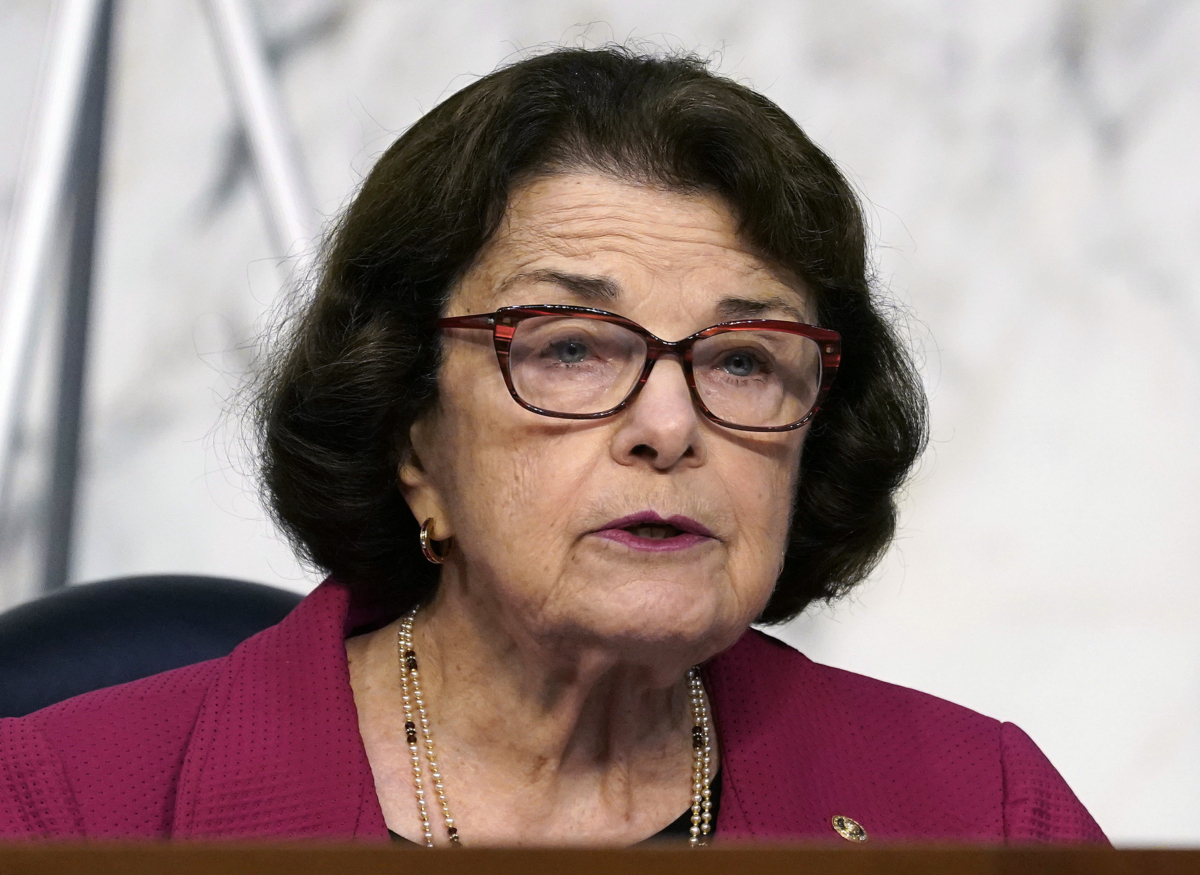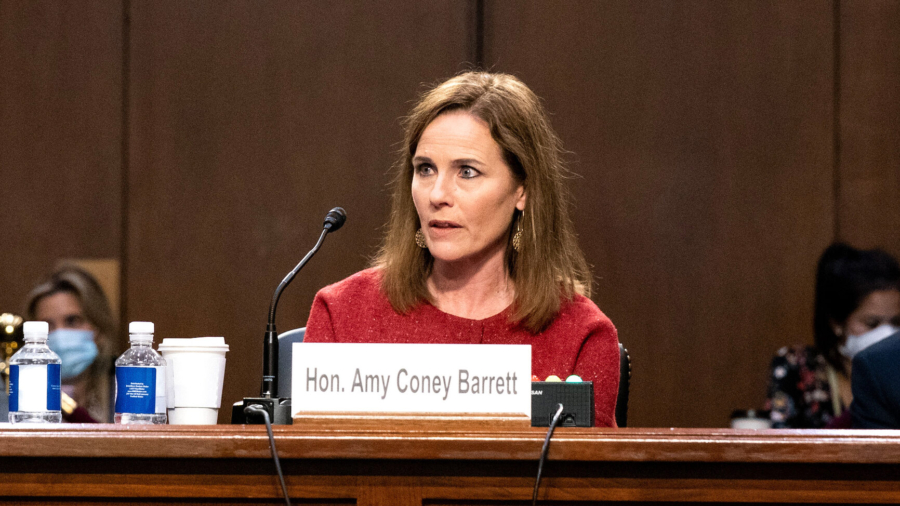Supreme Court nominee Amy Coney Barrett remained tight-lipped on her views during the second day of the confirmation hearings as Senate Democrats interrogated her to ascertain how she would rule on politically-charged issues.
Citing Associate Justice Ruth Bader Ginsburg, Barrett said she would adhere to the late justice’s standard by offering “no hints, no previews, no forecasts” on pending cases or express a view on Supreme Court precedents as it would “be wrong” and violate the canons on judicial conduct.
“I’m not going to express a view on whether I agree or disagree with Justice Scalia for the same reasons that I’ve been giving,” Barrett told senators on the Judiciary Committee on Oct. 13.
“Justice Ginsburg, with her characteristic pithiness, used this to describe how a nominee should comport herself at a hearing. ‘No hints, no previews, no forecasts.’ That had been the practice of nominees before her, but everybody calls it the Ginsburg Rule because she stated it so concisely and it has been the practice of every nominee since.”
Senate Democrats employed various questioning tactics to push Barrett to reveal her views on the Affordable Care Act, abortion, the Second Amendment, voting, and LGBTQ, among other social issues. But the judge was insistent that she was unable to oblige.
“Senator, I do want to be forthright and answer every question so far as I can. I think, on that question, you know, I’m going to invoke Justice Kagan’s description, which is perfectly put. When she was in her confirmation hearing she said that she was not going to grade precedent or give it a thumbs up or thumbs down,” Barrett said while responding to Ranking Member Dianne Feinstein (D-Calif.)’s question about Roe v. Wade (Roe), the 1973 Supreme Court decision that legalized abortion nationwide.
“And I think in an area where precedent continues to be pressed and litigated, as is true of [Planned Parenthood v.] Casey, it would be particularly—it would actually be wrong and a violation of the canons for me to do that as a sitting judge. So if I express a view on a precedent one way or another whether I say ‘I love it’ or ‘I hate it’ it signals to litigants I might tilt one way or another in a pending case,” she added.

When Feinstein pressed her again on abortion, Barrett told the Californian senator that she has “no agenda” to try to overrule Planned Parenthood v. Casey, a later Supreme Court decision that upheld the right to abortion under Roe and set the “undue burden” standard for abortion restrictions.
“I can’t pre-commit or say I’m going in with an agenda, because I am not. I don’t have any agenda. I have no agenda to try to overrule Casey,” Barrett said while adding that, “I have an agenda to stick to the rule of law and decide cases as they come.”
Barrett’s legal opinions and dissents from her time as a federal judge on the 7th Circuit Court of Appeals were also scrutinized during the hearing. Feinstein asked her about her views about gun regulation, referring to the judge’s dissent in Kanter v. Barr. In that case, Barrett argued that legislatures only have the power to bar “dangerous people” from possessing guns.
“What I said in that opinion, I stand by, which is, that the original meaning of the Second Amendment, and I went through a lot detailed history, that case does support the idea that governments are free to keep guns out of the hands of the dangerous. So for example, the mentally ill, others who would be likely to misuse guns,” Barrett said.
She went on to explain that Kanter demonstrates her judicial philosophy and shows how she would approach any potential cases related to gun regulation.
“What I can say is that my opinion and Kanter shows how I approach questions as a matter of judicial philosophy. I spent a lot of time looking at the history of the Second Amendment and Supreme Court cases. The way in which I would approach the review of gun regulation is in that same way, to look very carefully at the text, to look carefully at what the original meaning was,” she said, adding that she would maintain an “open mind” when applying the law.
Sen. Dick Durbin (D-Ill.) also challenged Barrett over that dissent, questioning her about the 2nd Amendment and the right to vote.
Obamacare
Barrett also fended off attempts by senators urging her to commit to recusing from cases related to the Affordable Care Act (ACA), also known as Obamacare, and potential 2020 presidential election disputes. She told senators that she has not made any promises about how she would rule cases relating to these two hot-button issues, if confirmed.
Democrats are making a case that Barrett was nominated by President Donald Trump to carry out his agenda to overturn the ACA and help him in potential cases relating to the upcoming election. The timing of Barrett’s hearings means that she could be confirmed in time to join the Supreme Court to hear oral arguments on Nov. 10 in the case that seeks to invalidate the ACA.
In an exchange with Sen. Patrick Leahy (D-Vermont), Barrett said that she has “had no conversations with the president or any of the staff on how I might rule in that case.”
“It would be a gross violation of judicial independence for me to make any such commitment, or for me to be asked about that case and how I would rule,” Barrett said while stressing that it would be a “complete violation” of the independence of the judiciary for anyone to appoint a justice on the top court for the purposes of “obtaining a particular result.”
In another exchange, she told Sen. Chuck Grassley (R-Iowa) that she has not made any promises or guarantees with anyone on how she would rule on any Supreme Court cases if she were to be confirmed.
“I want to be very clear about this, Sen. Grassley, the answer is no one. I submitted a questionnaire to this committee in which I said ‘no.’ No one ever talked about any case with me. No one on the executive branch side of it,” she said.
“And so just as I didn’t make any pre-commitments and was not asked to make any commitments on the executive branch side, I can’t make any pre-commitments to this body either. It would be inconsistent with judicial independence.”
She told senators that the issue of recusal involves legal considerations and is governed by federal statute, which she would abide by. She said she is also governed by precedents under the rule, citing Justice Ruth Bader Ginsburg, who said recusal is a decision that is up to the individual justice and “always involves” consultation with the other eight justices.
“So that’s not a question that I could answer in the abstract,” Barrett told committee chairman Sen. Lindsey Graham (R-S.C.).
During the hearing, Barrett also clarified her position on the ACA. Although the judge has not indicated that she would overturn the law, Democrats say her opinion in a 2017 law journal article shows her hostility toward former President Barack Obama’s signature health care law.
She said that although she critiqued the statutory interpretation of the majority opinions of past Supreme Court cases involving the ACA—National Federation of Independent Business v. Sebelius and King v. Burwell—while she was a law professor, she is not hostile to the law.
“I assure you I am not hostile to the ACA. I’m not hostile to any statute that you pass,” she told Sen. Dick Durbin (D-Ill.). “So to assume that because I critiqued the interpretation of the [individual] mandate or the phrase ‘established by a state’ means that on an entirely different legal question of severability I would reach a particular result, just assumes that I’m hostile. That’s not the case. I apply the law. I follow the law. You make the policy.”
The committee hearings are scheduled to last through Oct. 15.
Zachary Stieber contributed to this report.
From The Epoch Times

